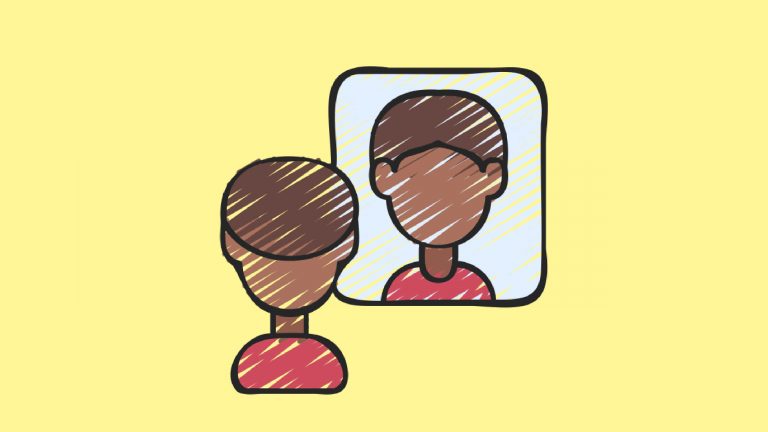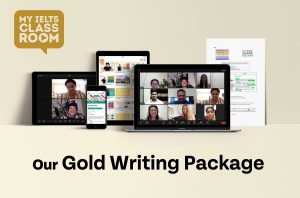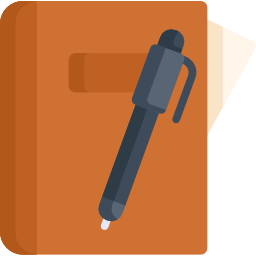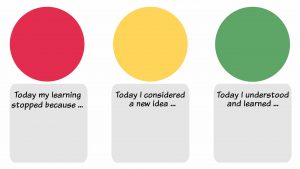
Metacognition for IELTS Learners – what it is and why you should use it!
In today’s podcast, Nick and I are going to interview two of our new teachers, Kristina and Tanya, about their experience teaching metacognition for IELTS learners. This is a technique that I was introduced to only recently, but one which I think has the potential to transform the way many students prepare for IELTS (and, indeed, learn throughout their lives).
I am really very excited to be sharing this episode today, but I also know that metacognition may be a new concept for many listeners, so I have written a short introduction to help you become familiar with the subject before you listen to the interview. I promise you, no single episode of the My IELTS Classroom podcast has the potential to change the way you learn as much as this one, so it really is worth taking the time to gather some background information before you press play to understand the importance of metacognition for IELTS learners.
- Subscribe to My IELTS Classroom podcast on Apple podcasts here
- Subscribe to My IELTS Classroom on Google podcasts here
- Become a Patreon to gain access to extra BONUS episodes here

Introduction to Metacognition for IELTS learners
Over the years, I have noticed that the students who improve most quickly are those who take an active role in their learning. These are the students who come to me at the end of the lessons and say things like:
- I am still struggling with the definite articles – can you give more practice of when to use the definite article with plurals?
- I find agree / disagree essays more difficult than other question types as I struggle to build arguments.
- I have noticed that in multiple choice questions, I always choose the distractors that contain key words from the conversation.
- I noticed I was really lacking vocabulary for essays that focus on business topics, so I started reading The Economist.
However, despite having a clear understand that what these students were doing was reflecting on their own learning, what I didn’t realise was that this reflection has a name, “metacognition”, and that is something that could be taught. In fact, I now believe that metacognition should be a corner stone in all IELTS preparation courses.
What is Metacognition?
Metacognition is, very simply, being aware of your own thoughts and feelings as you study. The most common description is that it is “thinking about your thinking” but I like to think of it more as “analysing your own performance so that you can make steps to improve”.

You see, far too often students look to their teachers as the sole provider of information for their learning. As a teacher, this can feel nice – I mean, who doesn’t want to be seen as a fountain of knowledge, answering any question that a student asks with ease. But when students look to their teacher for all the answers to their questions, they are overlooking their most valuable resource: themselves.
Yes, having a good teacher can make a massive difference to your learning, but even great teachers can only help you to improve your English skills so far. After all, every learner is unique and has their own set of strengths and weaknesses. A strategy that works for you in reading may not work for another student. The language that you may need to improve your lexical resource score maybe different to your study partner, even though you both currently have the same score.
Figuring out how you can be an independent, self-regulated learner even when the teacher is not in the classroom, can be a huge step to success, and this is where metacognition steps in.
Reflecting on your own learning in meaningful ways requires you to be a critical analyst of your own thinking. If you can do this, you will find that in time you are able to overcome complex or unexpected problems on your own, or at least with less input from a teacher. Even better, you may find that you are able to manage the emotions that surround your learning better and unlock more positives forms of “internal motivation” (which we discuss a lot in the episode).
If you are looking for the highest level of support and guidance in your IELTS journey, then why not find out about our award-wining Gold Package by clicking here.

An example of metacognition in action
I am sure by now you are wondering what metacognition actually looks like, so let me give you an example from my own teaching this week.
I have been working with a lovely proficiency student called Sergei and had recommended that he listened to a podcast called “So, you have been publicly shamed?” as it was connected to one of the topics in our book. However, despite having a very high level of English, Sergei struggled to understand the first episode. This surprised me. We often recommend podcasts to each other, and there had been others that I felt were much more difficult in terms of language and accent, so I was really unsure as to why he had found this one so tricky. In other words, I, “the teacher”, had no idea why he had struggled. Guess who did know? Sergei!
I realised that I wasn’t enjoying the podcast and I asked myself why – what was I feeling? And I realised that I was bored and frustrated. Then I asked myself why I was feeling bored. What was it about this podcast that was different to the others that I usually listen? It was then I realised that usually I listen to podcasts with two presenters, and so the conversation in those was natural. The intonation of the speakers had highs and lows, and they placed emphasis on certain words. But in this podcast, there was just one speaker and he was reading from notes. This made it harder for me to follow and it was a bit boring. That is why I wanted to stop. I could have continued but I wasn’t enjoying it, and I realised that I wanted to spend my time more productively listening to a podcast that I connected with.
“I asked myself what I was feeling”. In all my twenty years of teaching, this is a sentence I have rarely if ever heard but look how fruitful asking it was. It took Sergei from a feeling of frustration to one of acceptance and taking a few moments to reflect on the experience meant we now had a clear answer as to why he had struggled understanding the podcast. Sergei plans to listen to more “lecture” style podcasts in the future to see if he can improve his listening without having so much intonation there to help him, and I plan to ask my students more often how they are feeling! This is metacognition in action.

How you can start to use metacognition
Today’s episode is just a starting point on our journey into metacognition. Over the coming months, I expect that we will return to this again and again, and we are planning to introduce metacognition training to all our IELTS packages in the New Year. However, I want to encourage you to start to become more reflective of your own learning from today. To do this, here are three simple techniques that you are use. We discuss all three in detail in the episode.
Keep a learning diary
The simplest way that you can start to reflect on your own learning is to start keeping a diary. Write down what you study each day and how long it took you. You may find that are studying much more or much less than you thought. More importantly, make a note of how you felt when you were studying. Were you interested, motivated, or bored? Can you think of a reason why you felt this way? After all, it is very different to find a grammar exercise difficult because you had been working all day and were tired than finding it difficult because you could not follow the concepts.

Set goals
Setting and reviewing personal goals is one of the best ways to introduce metacognition into your learning. In general, you want to use the three stages of planning, monitoring, and evaluating to help you set and constantly re-evaluate your goals.
Sit down now and think about your IELTS goals, both short- and long-term. Be as detailed as you can.
A good place to start is with your current scores (and if you don’t know what they are, we can help you). Then, you look at the areas that you want to improve. How long do you think it will take? What skills will you need to do so? For example, if you want to improve a band in writing, what do you think you will need to be able to do differently to reach that score? Is it your grammar or your task response that need to improve, or both? Try to make a list of the specific skills you are missing (and if you do not know, consider getting professional help at this stage).
Try to make sure that your goals are both challenging and realistic. There is no point saying that you want to improve a full band in two weeks – nobody can do that! However, only you can know what is a realistic time frame for improvement as that will depend on how many hours a week you have to study, what skills you are personally “missing”, and how motivated you are to study.
Once you have those goals and the steps you think you will need to take to reach them, start working hard according to your plan. Then, after about a month, stop and take a practice test to see how far you have moved towards your goals. This is the “monitoring” stage and is crucial as it will let you know how well your study plan is working.
If you are still scoring the same number of points in reading, for example, despite studying hard on what you think are your weak areas, it may be time to sit down and analyse again what you are actually missing. If you are puzzled as to why you are not improving, this may be the time to ask a teacher for guidance again.
However, the more you have tried to resolve the problems on your own, the quicker a teacher will be able to help as you will be able articulate more clearly what you are struggling with. For example, I can help the student who tells me that they have trouble with “multiple choice questions that ask you to infer what the writer suggests” much more quickly than the student who tells me they have trouble with “multiple choice questions” as they have already narrowed down the problem for me.
Don’t make the mistake of “monitoring” too early – you will want to study for at least 2 or 3 weeks before you check your improvement. Taking test after test is not helpful at all and is sure-fire way to feel frustrated (but you should learn this yourself!)
Use the “Traffic Light” system
One important thing about using metacognition is that it does not always focus on what we “do” but “how we feel” (as we saw with the example of Sergei). The traffic-light system is a simple technique that you can use start to train yourself to be aware of your feelings.

At the end of each study sessions, spend a moment to sit down and reflect on how you felt.
- If you have encountered a challenge, you can write it down in the red column.
- If you have thought differently about something or have had a new idea or a new perspective, then write it down in the yellow column (these can often be the most interesting)
- If your study went well, write down what you understood and learned in the green column.
Over time, this should help you to noice patterns in your learning and to pinpoint what makes you stop and what helps you to continue studying effectively. You can then use this information to update your study plan.
Again, today’s lesson is designed to an introduction to metacognition for IELTS learners. Just like you, I still have a lot to learn about the subject, but I hope that today’s lesson will encourage you to start thinking more about your own IELTS journey and the steps YOU think you need to take to end it. As a teacher, it can be hard for me to encourage students to move away from my own coaching, but I strongly believe that in becoming a more independent learner, you give yourself the best chance of success, and that is all any teacher ever wants for their students.

